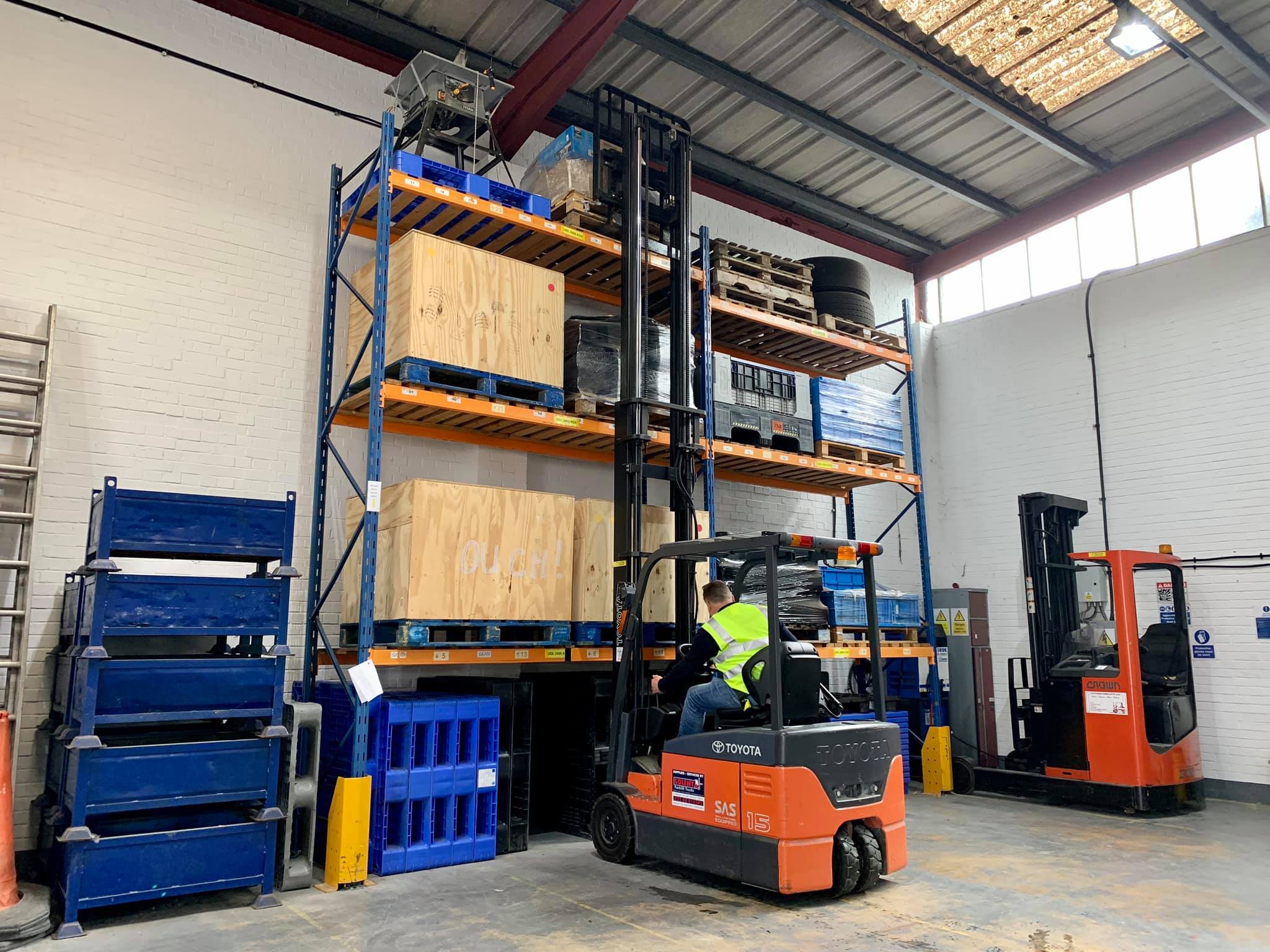
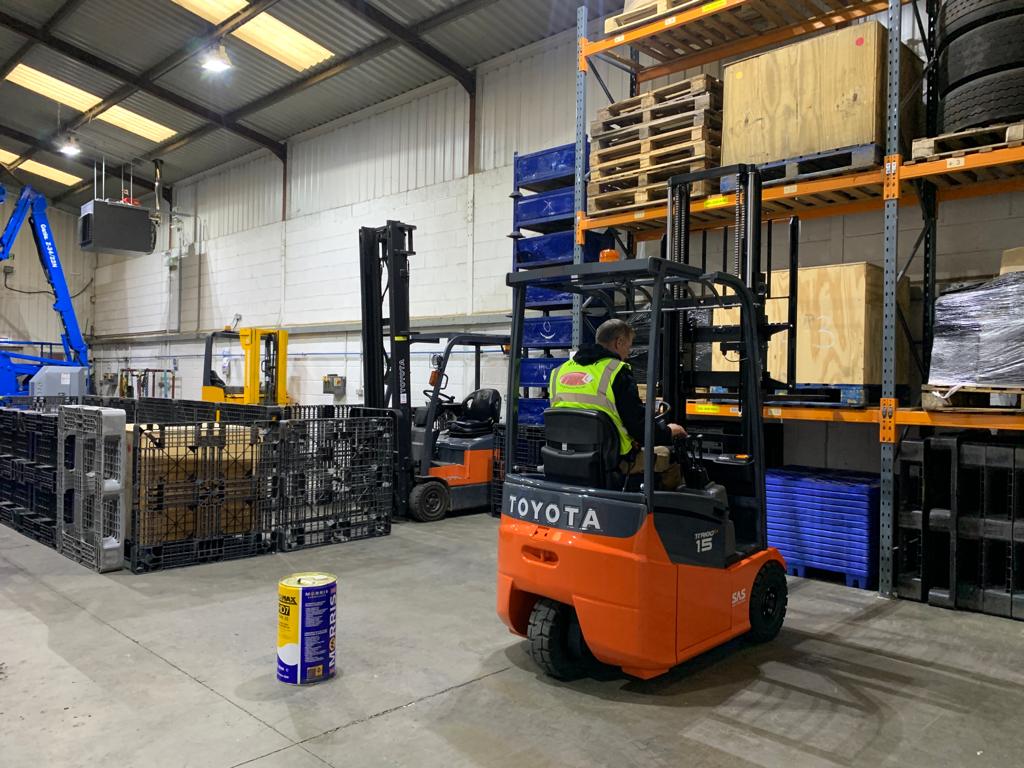
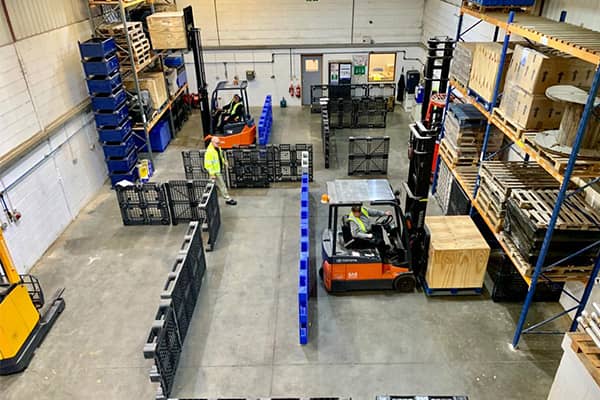
Counterbalance Forklift
From: £240.00
A B1 Counterbalance Forklift is the most common type of forklift truck that is used in industry today. They are versatile and allow you to move loads both indoors and outdoors and are able to stack loads at various heights. This truck type has a “counterweight” on the back of the truck, hence the name. Counterbalance Forklift. Training can consist of both indoor and outdoor manoeuvring. With Independent Training Standards Scheme & Register (ITSSAR) accreditation, you will be ensuring that you get the proper training and certification when completing one of our Counterbalance training courses.
Categories :
B1: Rider Operated Counterbalance Lift Truck – up to and including 5,000kg lifting capacity
B2: Rider Operated Counterbalance Lift Truck – above 5,000kg up to and including 15,000kg lifting capacity ( training available on Customer site only )
B3: Rider Operated Counterbalance Lift Truck – above 15,000kg 000kg lifting capacity ( training available on Customer site only)
Courses for all experience levels
N
Novice Level Training
Trainees with little or no previous experience operating the relevant truck.
E
Experienced Forklift Training
Trainees with relevant experience who have not received any approved training, or certification is expired (over five years from issue date).
R
Forklift Refresher Training
Periodic forklift refresher training for experienced operators who hold an accredited certificate issued in the last five years.
C
Forklift Conversion Training
Training on a truck of a similar level to the one that the operator has already been trained, tested, and certified on.
Still unsure, speak to an advisor today!
Our team of advisors are on hand to discuss your training requirements and answer any questions you may have. Book today to secure your space on our next training course.
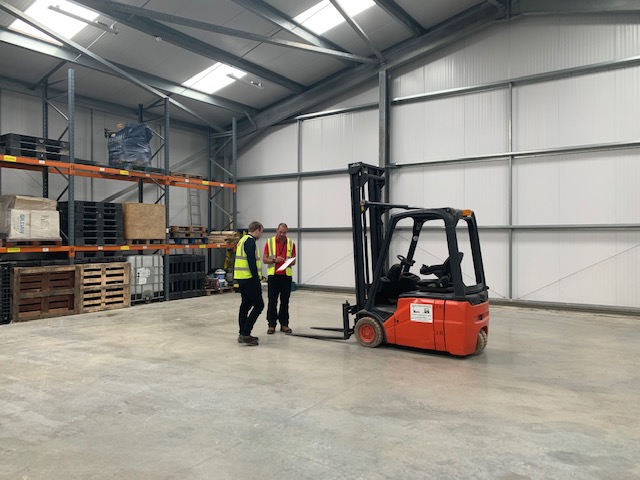
What’s Included
You can expect to train with an ITSSAR accredited Forklift instructor who will build your knowledge and comprehension around the safe operating and use of a B1 Counterbalance Forklift Truck. You can Either complete your course at one of our training depots with dedicated warehouse and training facilities. Or, depending on your location, complete your course at your own site.
Course Modules
The following list are the elements that make up a novice Counterbalance Forklift course. For experienced operators, safety refresher and conversion courses the list can be shorter.
- Course induction
- The need and reasons for training and statutory requirements (HASAWA 1974, Provision and Use of Work Equipment Regulations 1998 (PUWER) Lifting Operations and Lifting Equipment Regulations (LOLER) 1998 & L117 Approved code of practice
- Introduction to equipment/control familiarisation/principles of operation
- Identification/use/adjustment of attachments in pre-determined positions including forks
- Recommended mount and dismount
- Introduction to motive, steering controls and practice
- Basic steering exercises – simple courses
- Advanced steering exercises – figure of 8/chicane/90° approaches
- Battery charging procedures/maintenance
- Operator safety code and relevant handout
- Daily pre-use inspections/refuelling procedures
- Engineering principles/rated capacity/stability
- Simple hydraulics (theory)
- Introduction to hydraulic controls, handling empty pallets low-level
- Load types/handling and weight assessment
- Stacking/de-stacking at low, medium and high levels on industrial racking*
- Stacking/de-stacking at low, medium and high levels bulk stacks*
- Stacking/de-stacking at low, medium and high levels cup post pallets*
- Manoeuvring with loads/ramps and inclines/handling awkward loads*
- Relevant safety films
- Vehicle loading and unloading (theory)*
- Vehicle loading and unloading (practical)*
- Multi-choice theory test
- Pre-use inspection test
- Practical skills test
* To be covered where relevant to operation or facilities permit
Course Benefits
ITSSAR Accredited Training
Dedicated Training Areas & Racking
Experienced Instructors
Counterbalance Forklift & Training Hardware Provided
Course Durations
1 Day
3 Days
5 Days
Durations available for this specific course.
Forklift Requirements
To complete training to operate a Counterbalance FLT, you must be at least 16 years old. The Forklift you are planning to operate must also be the Truck you are completing training and testing for.
Ongoing Requirements
To keep your certification, it is highly recommended in accordance with L117 code of practice to complete refresher training within a 3-5 year period.
Test Requirements
You will complete three tests in total.
- Theory Test.
- Pre-use Inspection Test.
- Practical Skills Test.
Theory Test:
The first is a theory-based assessment where you need to answer a set of written questions. These will be in conjunction with what you have learnt with your instructor. The test consists of 25 questions, which will establish your knowledge when it comes to operating and safety.
Each question set provides the chance to receive 4 marks, with a total of 100 marks available. You must get 80% of all questions correct (80 marks) to pass the theory test.
Pre-use Inspection test:
The pre-use checks test is designed to evaluate an operator’s ability to correctly asses and check the key components of the counterbalance forklift to ensure the vehicle is safe and fit for use and includes checking the key areas of the forklift listed below.
Walkaround Visual Checks:
- Rated Capacity Plate
- Forks
- Carriage
- Load guard / Back-Rest Extension
- Mast / Mast Rollers
- Lift Chains/ Chain Pulleys
- HydraulicHoses & Pipes
- Wheels / Tyres
- External Condition
- Operating position
- Operators Seat / Seat Belt
Functional Checks:
- Lights & Warning Indicators
- Horn and Warning Alarms
- Hydraulic Controls
- Drive and Braking
- Steering
Fuel Checks:
- Petrol/Diesel/LPG
- Fuel Level
- Fuel Connectors
- Engine Oil Level
- Coolant Level
- Battery
- Fan or Other Belts
- Inching Pedal
- LPG Bottle Security
- Electric
- Electrolyte Levels
- Cable Connections
- General Cleanliness
- Battery Security
Practical Skills Test:
At the end of your training There is also a practical test. This is to demonstrate your practical ability on what you have learnt during your training course.
- Mounting, starting and stopping the truck
- Drive both forwards and reverse, including braking
- Steer accurately
- Correctly place a load on the forks
- Use the hydraulic controls correctly
- Show that you can judge the position of fork tips at varying heights
- Stack and de-stack at varying heights safely
- Be cautious of the working environment and judgment of speed, height, width and distance from within the confines of the machine
- Dismount and park the truck
These are all considered critical skills which show safe application methods throughout your test.
The practical test will consist of how well and safely you operate the Machine. penalty points will be given for Faults made during the test. The practical skills test has a maximum allowance of 40 penalty points that can be incurred. The test is also to be completed within a given time.
Further Training
While refresher training can be completed for the Counterbalance Forklift, you can opt for a conversion course, which will take the skills you have already acclaimed through your Counterbalance training, and implement it with another Forklift Truck, such as a Reach FLT.
You can choose to upskill and complete our Forklift Instructor course, so you can train other individuals in getting their FLT certification.
Earning Potential
Reputable Salary Checkers estimate the following for a forklift operator across the South Coast:
While all efforts have been made to ensure the accuracy of this information, we suggest conducting your own research and use these figures for information purposes only.
- Counterbalance Forklift Operators in Hampshire averages £22,641 per annum
- Counterbalance Forklift Operators in Reading averages £29,466 per annum
- Counterbalance Forklift Operators in Worthing averages £26,987 per annum
- Counterbalance Forklift Operators in Portsmouth averages £23,886 per annum
- Counterbalance Forklift Operators in Theale averages £28,282 per annum
Who is this course for?
This training is for anyone who requires a B1 Counterbalance Forklift truck certification. You must be a Minimum of 16 years old to attend this course. If you have never completed any training before, or operated any kind of FLT, then you will need to complete the Novice course.
You could also look at completing the conversion course if you already have a valid certification for another or similar truck type. Training length will depend on the certification type you have and Machine type you are converting to, as each FLT is different and requires different elements of learning.
A good understanding of spoken and written English is required for this course. Translator may be required to assist if English is not the first language as required within ITSSAR standards.
What can I operate with a Counterbalance Certification?
You can operate any Counterbalance Forklift truck with a maximum load capacity of 5-tonnes with this certification. If you want to operate a Reach truck, for example, you would only have to complete a conversion course for the Reach Forklift truck.
Under no circumstances should you try to operate any FLT you do not have the certification for.
What will you receive upon successful completion of this course?
Upon successfully passing this course, you will receive a certificate issued by 2 Start and added to the ITSSAR TOPS register. You can also (for a small additional cost) receive an ID card for the Trained Operator Passport Scheme (TOPS) – this is available from ITSSAR directly.
Frequently Asked Questions
What are the key topics covered in Counterbalance Operator Training?
Counterbalance Forklift Operator Training typically covers several key components to ensure safe and effective operation. These include:
– Forklift Familiarization: Understanding the parts, functions, and controls of the forklift.
– Pre-Operational Checks: Performing safety checks to ensure the forklift is in good working condition.
– Operation Techniques: Learning how to operate the forklift safely, including lifting, lowering, and manoeuvring loads.
– Load Handling: Proper techniques for picking up, transporting, and stacking loads to prevent accidents.
– Workplace Safety: Identifying hazards in the work environment and understanding safety protocols.
– Regulatory Compliance: Knowledge of local safety regulations and forklift certification requirements.
The training includes both theoretical lessons and practical hands-on exercises to ensure the operator can safely handle the equipment in various environments.
How long does it take to complete Counterbalance Forklift Operator Training?
The duration of Counterbalance Forklift Operator Training varies depending on the course provider and the learner’s prior experience.
– For beginners, the full training course, including theory and practical components, may take up to 5 days.
– For experienced operators, the training may be completed in 2 or 3 days, as they only need to refresh their skills and knowledge.
Upon completion, operators are often required to pass a theory exam and practical assessment to receive their forklift certification.
Why Choose 2 Start?
Reputable
High Pass Rates
Established in 2008
Industry Leading Training Provider
Independently Owned
6 Dedicated Training Centres
VIEW COURSESTrusted
4.9 Star Rating on Google Reviews
DVSA Approved 3a Examiners
DVSA Approved Test Centres
APAR Approved Training Provider
RLI Certified LGV Instructors
BOOK NOWAccredited
Accredited Instructors & Courses
Regular Accrediting Body Audits
Exceptional Audit Pass Marks
Listed With 9 Accrediting Bodies
Verifiable Accreditations
THE TEAM3 Past student reviews for Counterbalance Forklift
Only logged in students who have purchased this course previously may leave a review.
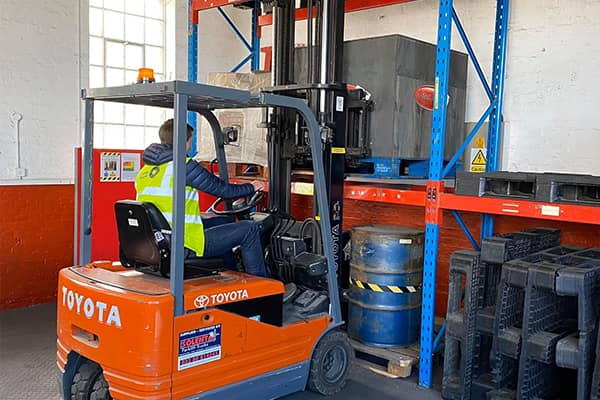
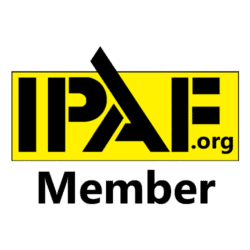
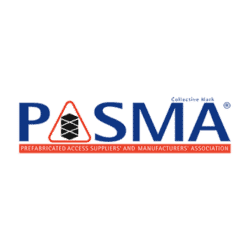
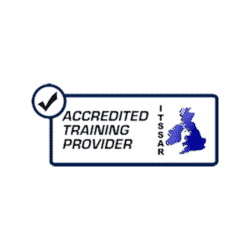
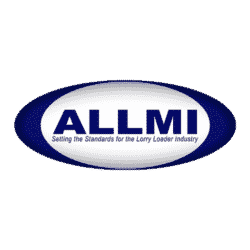
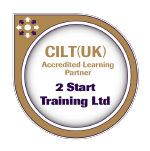
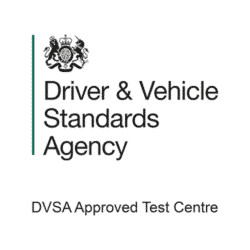
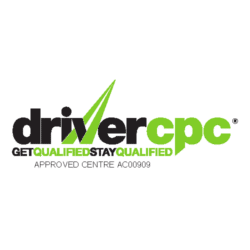
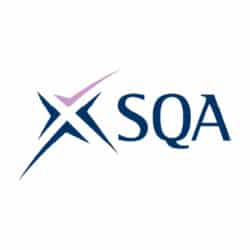
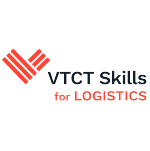

Laura –
I found Roy a to be a very approachable instructor, he was calm and clear with his instructions and he didn’t show any irritation at repeating himself. A professional throughout and thorough with his training.
Joe Collins –
Gave good and clear instructions throughout the week very supportive when I was struggling.
Matthew Grinter –
All round the course was great from start to finish. It was my first time using a forklift and Dave was cool and calm.